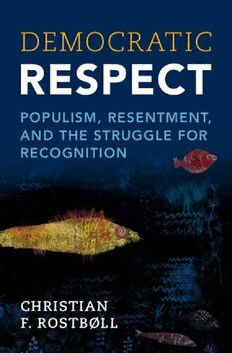
Democratic Respect: Populism, Resentment, and the Struggle for Recognition PDF
245 Pages·2023·1.043 MB·English
Most books are stored in the elastic cloud where traffic is expensive. For this reason, we have a limit on daily download.
Preview Democratic Respect: Populism, Resentment, and the Struggle for Recognition
Description:
Commentators often interpret the resentment of supporters of populism as blindly emotional and unconnected to facts and principles. Democratic Respect argues instead that we should approach the populist politics of resentment as a struggle for recognition based on moral experiences that are intimately connected to people's factual and moral beliefs. By associating populist resentment with alleged violations of democratic principles, we can discuss what citizens and governments owe one another in terms of recognition and respect. Populism advances a unique interpretation of democracy and recognition, which Rostbøll confronts with the notion of democratic respect. How democracy should recognize the people is shown to be connected to debates over the meaning and value of democratic procedures, rights, majority rule, compromise, and public deliberation. The book builds a bridge between empirical research and philosophical analysis, while providing insights relevant to a public grappling with the challenges many democracies face today.
See more
The list of books you might like
Most books are stored in the elastic cloud where traffic is expensive. For this reason, we have a limit on daily download.
